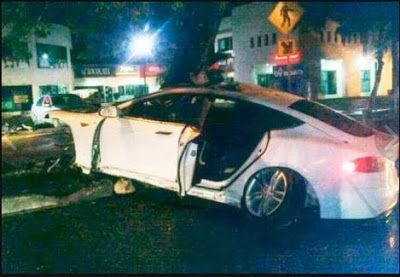Another Tesla Model S has crashed and burned. Tesla’s stock price fell today when the news broke, closing at $162/share when in September (before the first fire) the price had reached almost to $195/share. The incident occurred in the Northern Yucatan Peninsula (Mexico) at 3 AM, to a car driven by a drunk man. The driver lost control, the car hit a roundabout, through an electric fence, hit a house, and burst into flames. The driver was able to escape either on foot or in another car.
Going by the picture above, the front end of the car got badly smashed up on what looks like a guard rail. And the rear wheels ended up at a funky angle too. A video (below) posted the day of the accident shows the car was seriously on fire, in the front of the car, and that a couple explosions can be heard from the fire.
See – October 18 fire![]() – October 1 fire
– October 1 fire![]()
Badly smashed car – catches fire – driver walks away, and wants to get another one. Sounds like the car is actually very safe even when put into an extreme situation.
The response to electric car fires is amplified way out of proportion to the response to gasoline car fires. It’s worth repeating – there are 200,000+ gasoline car fires per year, and they’re so common they largely go unreported. Except in a few egregious cases. For example, last year a limousine full of young women heading to a bridal shower caught fire and burned killing everyone on board. That sad case is getting a lot of attention, but most car fires do not.
By my best estimate, since 2010 when electric cars began being sold to the public, they’ve been driven nearly 700 million miles. There have been four car fires in electric cars, giving us one fire every 150 million miles or so. Compare that with the rate in gasoline powered cars, one every 20 million miles, and you see that electric cars are much safer than gasoline cars![]() . Probably.
. Probably.
The safety record for the Tesla Model S is not on a good course, however. The company reports 100 million miles of Tesla Model S driving. With the first car fire (October 1, 2013) the company was able to handwave and say their safety record is one fire per 100 million miles of driving. Now that there have been two fires, the number drops to one fire per 50 million miles of Model S driving. Which is getting uncomfortably close to the rate for gasoline car fires.
Also consider that the Chevy Volt has had 289 million miles of driving, and zero fires. I don’t have a recent figure for the Nissan Leaf, but in December 2012 they’d reported 100 million miles of Leaf driving, with almost another year and strong Leaf sales this year, that figure is surely much higher. (See my spreadsheet on electric vehicle miles driven![]() ) Perhaps a half billion miles of electric driving between the Volt and the Leaf, with zero fires.
) Perhaps a half billion miles of electric driving between the Volt and the Leaf, with zero fires.
We have something to ponder. Since early results show a higher rate of Model S car fires than for the Leaf and Volt, is there something about the Model S which makes it more prone to fire? We don’t want to have to ponder this, but the trend of facts points us in that direction.
The Model S has an obvious risk factor, it’s massive acceleration capabilities. That feature is part of why the car is such a joy to drive, but in the wrong hands can be dangerous. It’s speed was almost certainly a huge factor in the October 18 accident, going by the accident description.
The good thing is that Tesla did their homework to ensure this car is very safe. They got a perfect five star rating in NHTA crash testing. And the Model S accidents have a good record of passengers who not only survive, but are largely unhurt.
- Highway design could decrease death and injury risk, if “we” chose smarter designs - March 28, 2015
- GM really did trademark “range anxiety”, only later to abandon that mark - March 25, 2015
- US Government releases new regulations on hydraulic fracturing, that some call “toothless” - March 20, 2015
- Tesla Motors magic pill to solve range anxiety doesn’t quite instill range confidence - March 19, 2015
- Update on Galena IL oil train – 21 cars involved, which were the supposedly safer CP1232 design - March 7, 2015
- Another oil bomb train – why are they shipping crude oil by train? – Symptoms of fossil fuel addiction - March 6, 2015
- Chevron relinquishes fracking in Romania, as part of broader pull-out from Eastern European fracking operations - February 22, 2015
- Answer anti- electric car articles with truth and pride – truth outshines all distortions - February 19, 2015
- Apple taking big risk on developing a car? Please, Apple, don’t go there! - February 16, 2015
- Toyota, Nissan, Honda working on Japanese fuel cell infrastructure for Japanese government - February 12, 2015













